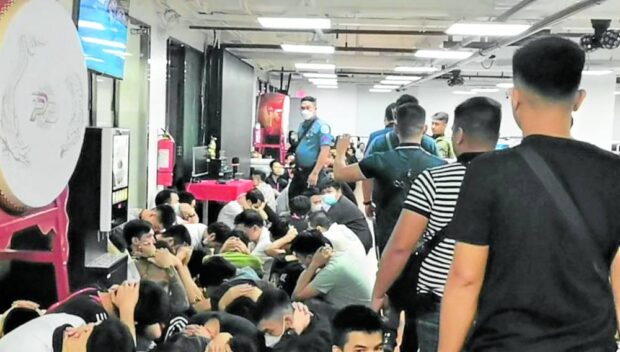Senators blame Pagcor, CDC for Pogo abuses, scams in Clark

CLARK RAID | This Philippine National Police handout photo shows the group of foreigners and Filipinos rescued from a human trafficking syndicate in Pampanga early this month.
MANILA, Philippines — The failure of concerned state agencies to keep a close watch on Philippine offshore gaming operators (Pogos) has allowed syndicates to use the online gaming establishments as “legal cover” for human trafficking and cybercrimes, senators said on Tuesday.
“The Pogos are being utilized to hoodwink innocent people,” Sen. Risa Hontiveros said at the Senate hearing into the rescue of more than 1,000 foreigners from a Pogo hub at Clark Freeport in Pampanga province.
“If Pogos are allowed to continue business as usual, the cryptocurrency scam and human trafficking operations will also grow at a frightening rate our government will never be able to handle,” she cautioned.
Sen. Sherwin Gatchalian said the illegal activities committed within the Pogo facilities should not have happened had the industry watchdog Philippine Amusement and Gaming Corp. (Pagcor) carried out its mandate to regularly inspect such establishments.
Pagcor, he claimed, had become “corrupt” and remiss in its primary function as a state gaming regulator.
He said Pogos, which he insisted should be shut down immediately, had brought only “international shame” to the Philippines with the proliferation of criminal syndicates involved in internet fraud.
Addressing Pagcor officials who attended the hearing, an irate Gatchalian said: “Pogo is being used as a front for scams [and] human trafficking because Pagcor is corrupt… That’s the bottom line.”
“You’re just fooling us,” the senator said, raising his voice. “That’s why we are all in this problem. You are not doing your job. You closed your eyes… Your inspectors have become corrupt.”
Subleased property
According to Hontiveros, a group of Chinese nationals ran and operated a “scam hub” inside a property being leased by Clark Development Corp. (CDC) to Donggwang Clark Corp., which had then subleased it to Sun Valley Clark Hub Corp. (SVCHC).
She said SVCHC, in turn, rented out the commercial compound to CGC Technologies Inc., which had leased a portion of the property to Colorful and Leap Group Co. (Colorful and Leap).
The senator said Colorful and Leap had been running its operations inside the two office buildings that members of the Anti-Cybercrime Group of the Philippine National Police raided on May 4 for allegedly operating a cryptocurrency scam.
Hontiveros, who led an inspection of the facility on Monday, said the company actually appeared to be an ordinary call center firm, with rows of computers and office chairs for its workers.
“However, a closer scrutiny will reveal the nefarious schemes that are perpetrated here. Trafficked nationals from Vietnam, China, Indonesia, Thailand, Taiwan, Hong Kong, Bhutan, Morocco, Nepal, and other countries worked there,” she noted.
“Every day, they would work to woo foreigners, usually men, to fall in love with them and later on force them to invest in cryptocurrency,” she added.
Like what happened to Filipinos who had fallen victim to similar syndicates in Myanmar and Cambodia, she said the foreigners were forced to work as scammers and were locked up inside a “dark room” when they refused to follow the orders of their “Chinese bosses.”
Visa problem
Sen. Raffy Tulfo then took the CDC to task for issuing work visas to foreigners who had entered the country as tourists and for failing to inspect the establishment that Colorful and Leap was renting.
He said this matter should be immediately corrected through legislation after Immigration Commissioner Norman Tansingco admitted that foreigners may apply for employment or student visa and seek an extension of their 30-day stay in the country.
“From the point of origin, foreigners should apply for the proper visa, which is a working visa, so that they will be vetted and screened appropriately,” Tulfo said.
Responding to Tulfo’s query, CDC vice president Noelle Mina Meneses admitted that Colorful and Leap was able to operate its illicit business due to the “failure of intelligence” of its security unit.
“That’s why I ordered their suspension and have them investigated,” CDC president and CEO Agnes Devanadera said.
Fielding questions from Gatchalian, Pagcor assistant vice president Jessa Mariz Fernandez owned up to their shortcomings, such as ensuring that the Philippine National Police, the Bureau of Immigration, and other pertinent government agencies have offices inside the Pogo hubs.
Fernandez said Pagcor had accredited only two Pogo centers—SVCHC’s facility in Pampanga and the so-called “Pogo Island” in Kawit, Cavite, of First Orient Corp.